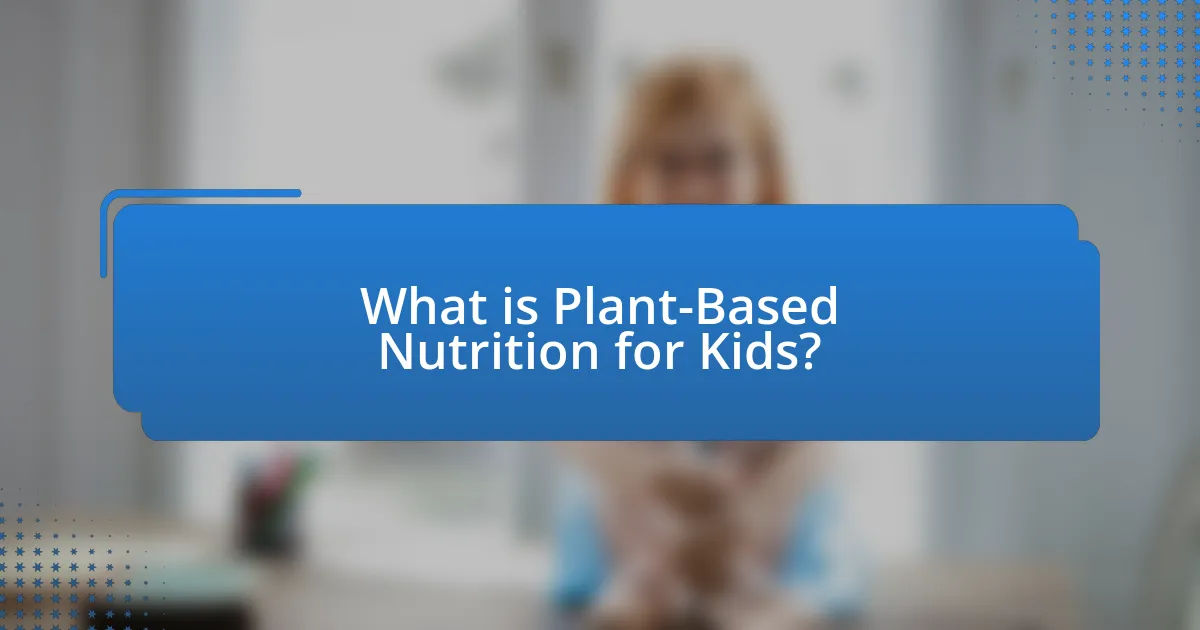Plant-based nutrition for kids emphasizes a diet rich in fruits, vegetables, whole grains, legumes, nuts, and seeds, which supports healthy growth and reduces the risk of chronic diseases. This article outlines the importance of teaching children about plant-based nutrition, highlighting its benefits such as improved heart health, better weight management, and essential nutrient intake. Key principles of plant-based diets, strategies for introducing these foods to children, and the environmental impact of dietary choices are also discussed. Additionally, the article addresses common misconceptions and challenges parents may face while promoting plant-based eating habits among their children.

What is Plant-Based Nutrition for Kids?
Plant-based nutrition for kids refers to a dietary approach that emphasizes the consumption of foods derived primarily from plants, including fruits, vegetables, whole grains, legumes, nuts, and seeds. This type of nutrition is beneficial for children as it provides essential nutrients, supports healthy growth, and reduces the risk of chronic diseases. Research indicates that plant-based diets can lead to lower body mass index (BMI) and improved cardiovascular health in children, as evidenced by a study published in the Journal of the American College of Cardiology, which found that children consuming plant-based diets had better heart health markers compared to those on traditional diets.
Why is it important to teach kids about plant-based nutrition?
Teaching kids about plant-based nutrition is important because it promotes healthier eating habits and supports overall well-being. Research indicates that plant-based diets can reduce the risk of chronic diseases such as obesity, diabetes, and heart disease. For instance, a study published in the Journal of the American College of Cardiology found that plant-based diets are associated with a lower risk of cardiovascular disease. By educating children on the benefits of plant-based foods, they can develop a preference for nutritious options, leading to lifelong healthy eating patterns.
What are the key principles of plant-based nutrition?
The key principles of plant-based nutrition include focusing on whole, minimally processed foods, emphasizing fruits, vegetables, whole grains, legumes, nuts, and seeds while minimizing or eliminating animal products. This approach promotes a diet rich in essential nutrients, fiber, and antioxidants, which are beneficial for overall health. Research indicates that plant-based diets can reduce the risk of chronic diseases such as heart disease, diabetes, and certain cancers, as supported by studies published in journals like the Journal of the American College of Cardiology, which found that plant-based diets are associated with lower mortality rates.
How does plant-based nutrition differ from other dietary approaches?
Plant-based nutrition primarily focuses on foods derived from plants, including fruits, vegetables, grains, nuts, and seeds, while other dietary approaches may include animal products or processed foods. This distinction emphasizes whole, minimally processed plant foods, which are associated with numerous health benefits, such as lower risks of chronic diseases like heart disease and diabetes, as supported by studies like the Adventist Health Study, which found that vegetarian diets are linked to lower mortality rates. Additionally, plant-based nutrition often promotes sustainability and ethical considerations regarding animal welfare, setting it apart from omnivorous or carnivorous diets that do not prioritize these aspects.
What are the essential nutrients in a plant-based diet?
Essential nutrients in a plant-based diet include protein, iron, calcium, omega-3 fatty acids, vitamin B12, vitamin D, and zinc. Protein can be obtained from legumes, nuts, and seeds, while iron is found in lentils, chickpeas, and fortified cereals. Calcium sources include leafy greens and fortified plant milks. Omega-3 fatty acids are present in flaxseeds and walnuts. Vitamin B12, crucial for nerve function, is primarily found in animal products, so supplementation or fortified foods are necessary for those on a strict plant-based diet. Vitamin D can be synthesized through sunlight exposure or obtained from fortified foods. Zinc is available in beans, nuts, and whole grains. These nutrients are vital for growth, development, and overall health, particularly in children.
Which vitamins and minerals are crucial for children’s growth?
Vitamins and minerals crucial for children’s growth include vitamin D, calcium, iron, and zinc. Vitamin D supports bone health and growth by aiding calcium absorption; studies show that adequate vitamin D levels are linked to improved bone density in children. Calcium is essential for developing strong bones and teeth, with the National Institutes of Health recommending 700 mg per day for children aged 1-3 years. Iron is vital for cognitive development and energy levels, as it helps in the formation of hemoglobin; the recommended intake for children aged 4-8 years is 10 mg per day. Zinc plays a significant role in growth and immune function, with a daily requirement of 5 mg for children aged 1-3 years. These nutrients collectively contribute to healthy growth and development in children.
How can kids obtain protein from plant sources?
Kids can obtain protein from plant sources by consuming legumes, nuts, seeds, whole grains, and soy products. Legumes such as lentils and chickpeas provide substantial protein; for instance, one cup of cooked lentils contains about 18 grams of protein. Nuts and seeds, like almonds and chia seeds, also contribute protein, with two tablespoons of chia seeds offering around 4 grams. Whole grains, including quinoa and brown rice, provide additional protein, with one cup of cooked quinoa containing approximately 8 grams. Soy products, such as tofu and edamame, are rich in protein as well, with half a cup of tofu containing about 20 grams. These plant-based foods can effectively meet the protein needs of children, supporting their growth and development.
How can parents introduce plant-based nutrition to their children?
Parents can introduce plant-based nutrition to their children by incorporating a variety of colorful fruits, vegetables, whole grains, and legumes into family meals. Engaging children in meal preparation can foster interest and excitement about plant-based foods, making them more likely to try new dishes. Research indicates that children are more open to trying foods when they are involved in the cooking process, as it enhances their connection to the food. Additionally, parents can educate their children about the health benefits of plant-based diets, such as improved heart health and better digestion, which can motivate them to embrace these choices.
What strategies can be used to make plant-based foods appealing to kids?
To make plant-based foods appealing to kids, incorporating fun and engaging presentations is essential. Strategies include using colorful fruits and vegetables to create visually appealing plates, involving kids in the cooking process to foster a sense of ownership, and presenting plant-based foods in familiar formats, such as smoothies or veggie sticks with dips. Research indicates that children are more likely to try new foods when they are involved in their preparation, as demonstrated in a study published in the Journal of Nutrition Education and Behavior, which found that children who participated in cooking activities were more open to tasting and accepting healthier foods.
How can parents involve kids in meal planning and preparation?
Parents can involve kids in meal planning and preparation by encouraging them to choose recipes, shop for ingredients, and assist in cooking. This hands-on approach fosters a sense of responsibility and interest in food. Research indicates that children who participate in meal preparation are more likely to try new foods and develop healthier eating habits. For example, a study published in the Journal of Nutrition Education and Behavior found that children who helped prepare meals were more inclined to consume fruits and vegetables. By engaging kids in these activities, parents not only teach them about plant-based nutrition but also enhance their culinary skills and confidence in the kitchen.

What are the benefits of a plant-based diet for children?
A plant-based diet for children offers numerous benefits, including improved nutrition, better weight management, and enhanced overall health. This diet is rich in essential nutrients such as vitamins, minerals, and fiber, which are crucial for a child’s growth and development. Research indicates that children who consume a plant-based diet have a lower risk of obesity, type 2 diabetes, and heart disease due to the lower levels of saturated fats and higher intake of antioxidants found in fruits, vegetables, whole grains, and legumes. Additionally, a plant-based diet can promote healthy digestion and support a robust immune system, contributing to fewer illnesses and better academic performance.
How does a plant-based diet impact children’s health?
A plant-based diet positively impacts children’s health by promoting better nutrition and reducing the risk of chronic diseases. Research indicates that children who consume a plant-based diet tend to have higher intakes of essential nutrients, such as fiber, vitamins, and minerals, which are crucial for growth and development. For instance, a study published in the Journal of the American Dietetic Association found that vegetarian children had lower body mass indexes and better cholesterol levels compared to their meat-eating peers. Additionally, plant-based diets are associated with a lower risk of obesity, type 2 diabetes, and heart disease, which are increasingly prevalent among children.
What are the long-term health benefits of plant-based nutrition?
Plant-based nutrition offers significant long-term health benefits, including reduced risk of chronic diseases such as heart disease, diabetes, and certain cancers. Research published in the Journal of the American Heart Association indicates that individuals adhering to a plant-based diet have a 32% lower risk of developing heart disease compared to those consuming a diet high in animal products. Additionally, a study in the American Journal of Clinical Nutrition found that plant-based diets are associated with lower body mass index (BMI) and improved metabolic health, which can lead to a decreased risk of type 2 diabetes. Furthermore, the World Health Organization recognizes that diets rich in fruits, vegetables, whole grains, and legumes can lower cancer risk, particularly colorectal cancer. These findings underscore the importance of plant-based nutrition in promoting long-term health and preventing disease.
How can a plant-based diet help prevent childhood obesity?
A plant-based diet can help prevent childhood obesity by promoting the consumption of nutrient-dense foods that are lower in calories and higher in fiber. This dietary approach encourages children to eat more fruits, vegetables, whole grains, and legumes, which are associated with lower body mass index (BMI) and reduced risk of obesity. Research indicates that children who consume a plant-based diet tend to have healthier eating patterns, leading to better weight management. For instance, a study published in the Journal of the American Dietetic Association found that children who followed vegetarian diets had significantly lower BMI compared to their non-vegetarian peers. This evidence supports the effectiveness of plant-based nutrition in combating childhood obesity.
What role does plant-based nutrition play in environmental awareness?
Plant-based nutrition significantly enhances environmental awareness by highlighting the ecological impact of food choices. This dietary approach reduces greenhouse gas emissions, as livestock farming is responsible for approximately 14.5% of global emissions, according to the Food and Agriculture Organization. Additionally, plant-based diets require less land and water, with studies indicating that producing plant foods generally uses 70% less land compared to animal products. By educating children about these facts, plant-based nutrition fosters a sense of responsibility towards sustainable living and encourages them to make informed choices that benefit the planet.
How can teaching kids about plant-based nutrition promote sustainability?
Teaching kids about plant-based nutrition promotes sustainability by instilling an understanding of the environmental benefits associated with plant-based diets. Research indicates that plant-based diets require significantly less land, water, and energy compared to meat-based diets; for instance, producing one kilogram of beef requires approximately 15,000 liters of water, while producing one kilogram of vegetables requires only about 300 liters. By educating children on these facts, they can make informed food choices that contribute to reduced greenhouse gas emissions and lower resource depletion. This knowledge empowers the next generation to adopt sustainable eating habits, fostering a culture of environmental responsibility.
What are the environmental benefits of reducing meat consumption?
Reducing meat consumption significantly lowers greenhouse gas emissions, as livestock farming is responsible for approximately 14.5% of global emissions, according to the Food and Agriculture Organization. Additionally, it conserves water resources; producing one kilogram of beef requires about 15,000 liters of water, while plant-based foods generally require much less. Furthermore, decreasing meat intake can lead to reduced deforestation, as large areas of forest are cleared for grazing land and feed crops. These environmental benefits collectively contribute to a more sustainable ecosystem and help mitigate climate change.

What challenges might arise when teaching kids about plant-based nutrition?
Teaching kids about plant-based nutrition can present several challenges, including resistance to change, limited exposure to plant-based foods, and misconceptions about nutrition. Kids may resist adopting a plant-based diet due to established preferences for animal products, making it difficult to encourage new eating habits. Additionally, many children may have limited exposure to a variety of plant-based foods, which can hinder their willingness to try new options. Misconceptions about plant-based nutrition, such as the belief that it lacks essential nutrients, can also create barriers to acceptance and understanding. These challenges require careful consideration and tailored approaches to effectively educate children about the benefits of plant-based nutrition.
How can parents address common misconceptions about plant-based diets?
Parents can address common misconceptions about plant-based diets by providing accurate information and resources. Educating themselves and their children about the nutritional adequacy of plant-based diets is essential; studies show that well-planned plant-based diets can meet all nutritional needs for children (American Dietetic Association, 2009). Parents can also dispel myths by highlighting the variety of plant-based foods available, such as legumes, grains, fruits, and vegetables, which can provide sufficient protein, iron, and calcium. Engaging children in cooking and meal planning can further reinforce the benefits and enjoyment of plant-based eating, making it a practical and appealing choice.
What are the typical objections kids might have to plant-based foods?
Kids typically object to plant-based foods due to taste preferences, texture issues, and a lack of familiarity. Many children are accustomed to the flavors and textures of animal-based products, leading to resistance when faced with unfamiliar plant-based options. Research indicates that children often prefer sweeter and more familiar flavors, which can make them hesitant to try vegetables or legumes that may not align with their taste preferences. Additionally, social influences, such as peer pressure and cultural norms surrounding food, can further contribute to their objections, as kids may feel different from their peers when consuming plant-based meals.
How can parents encourage open discussions about dietary choices?
Parents can encourage open discussions about dietary choices by creating a supportive environment where children feel comfortable expressing their thoughts and questions. This can be achieved by actively engaging in conversations about food, asking open-ended questions, and sharing personal experiences related to dietary choices. Research indicates that children are more likely to adopt healthy eating habits when they are involved in discussions about nutrition, as it fosters critical thinking and decision-making skills. For instance, a study published in the Journal of Nutrition Education and Behavior found that children who participated in family meals and discussions about food were more likely to make healthier food choices.
What resources are available for teaching kids about plant-based nutrition?
Resources available for teaching kids about plant-based nutrition include educational books, interactive websites, cooking classes, and nutrition workshops specifically designed for children. For instance, books like “Plant-Powered Families” by Dreena Burton provide kid-friendly recipes and nutritional information. Websites such as KidsHealth.org offer articles and activities focused on healthy eating, including plant-based diets. Cooking classes, often available at community centers or online platforms, engage children in hands-on learning about plant-based cooking. Additionally, organizations like the Academy of Nutrition and Dietetics provide resources and guidelines for educators to effectively teach children about the benefits of plant-based nutrition.
Which books and websites provide valuable information on plant-based diets for kids?
Books that provide valuable information on plant-based diets for kids include “Plant-Powered Families” by Dreena Burton, which offers kid-friendly recipes and nutrition tips, and “The How Not to Die Cookbook” by Michael Greger, which includes recipes suitable for children. Websites such as Forks Over Knives provide a section dedicated to plant-based recipes and nutrition for families, while the Academy of Nutrition and Dietetics offers resources on vegetarian diets for children, emphasizing the importance of balanced nutrition. These sources are recognized for their evidence-based approaches to plant-based nutrition, making them reliable for parents seeking to educate their children on healthy eating habits.
How can cooking classes or workshops enhance kids’ understanding of plant-based nutrition?
Cooking classes or workshops enhance kids’ understanding of plant-based nutrition by providing hands-on experience with preparing and cooking plant-based foods. This practical engagement allows children to learn about the nutritional benefits of fruits, vegetables, grains, and legumes while developing essential cooking skills. Research indicates that children who participate in cooking activities are more likely to try new foods and adopt healthier eating habits, as evidenced by a study published in the Journal of Nutrition Education and Behavior, which found that cooking interventions increased fruit and vegetable consumption among children. By actively participating in the cooking process, kids can better grasp the importance of plant-based nutrition and its role in a balanced diet.
What are some practical tips for implementing plant-based nutrition at home?
To implement plant-based nutrition at home, start by incorporating a variety of fruits, vegetables, whole grains, legumes, nuts, and seeds into daily meals. This diverse selection ensures that nutritional needs are met while making meals appealing to children. Meal planning can help in organizing plant-based meals for the week, making it easier to include a range of nutrients. Involving kids in cooking can enhance their interest in plant-based foods; research shows that children are more likely to try new foods when they participate in the preparation process. Additionally, keeping healthy snacks like cut fruits and vegetable sticks readily available encourages kids to choose plant-based options. Educating children about the benefits of plant-based nutrition, such as improved health and environmental impact, can foster a positive attitude towards these foods.


